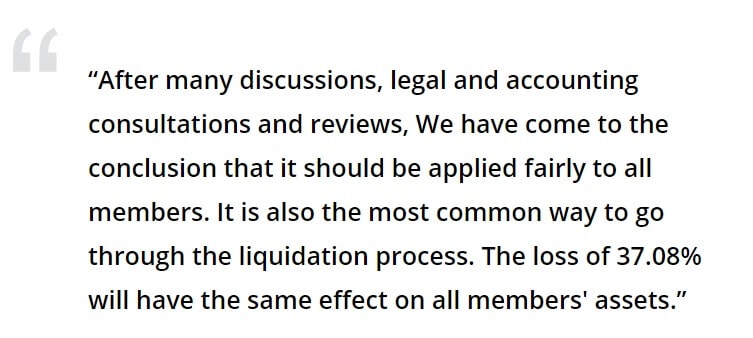Cryptocurrency Exchange Hacks (Updated List For 2025)
TABLE OF CONTENTS
Crypto Hacks: What Have We Learnt
- A cumulative amount of nearly USD 3.42 billion has been stolen from crypto exchanges since 2012, with the latest exchange being WazirX, which lost around USD 325 million in a recent hack.
- Approximately 0.3% of the total market cap (904 billion) has been lost to crypto exchange hacks.
- At least 49 Bitcoin exchanges have lost funds through a major cybersecurity breach.
- Successful hacking attempts have decreased since 2021 with improvements to enterprise-distributed storage solutions.
- The most common form of hacking attack was infiltrating the private keys to the exchange's hot wallet.
- It is difficult to verify whether cold wallet solutions are 100% offline, as the exchange's website states.
- Lack of visibility on internal security processes and adherence to strict management protocols.
- The best method to store cryptocurrency assets is still using a personal hardware wallet.
Cryptocurrency Exchanges Can Be Hacked
Cyber security threats have existed since the beginning of the internet and occur daily using sophisticated means. Criminals and organized hackers are targeting crypto exchanges to extract lucrative amounts of wealth in the form of Bitcoin, Ethereum, and others. Since 2012, at least 48 cryptocurrency exchanges have suffered major hacks, resulting in numerous crypto platforms shutting down. A record number of 19 crypto exchanges were compromised by hackers in 2019 alone, with the number decreasing in recent years.
Below is a complete list of cryptocurrency exchanges and platforms hacked or suffered significant security breaches. If we have missed anything, please let us know by contacting us.
| Date | Exchange | Cause of Hack | Amount Stolen (USD) |
|---|---|---|---|
| 2024, July 18 | WazirX | Obtained access to hot wallet | $235 million |
| 2024, May 31 | DMM Bitcoin | Unauthorized transactions | $320 million |
| 2023, April 9 | GDAC | Obtained access to hot wallet | $13 million |
| 2022, November 12 | FTX | Unauthorized transactions | $600 million |
| 2022, January 17 | Crypto.com | Unknown | $34 million |
| 2021, December 11 | AscendEX | Obtained access to hot wallet | $80 million |
| 2021, December 5 | BitMart | Obtained access to hot wallet | $150 million |
| 2021, August 19 | Liquid | Obtained access to hot wallet | $97 million |
| 2021, April 29 | Hotbit | Obtained access to hot wallet | Nil |
| 2020, December 23 | Livecoin | Compromised system/servers | Unknown |
| 2020, December 21 | EXMO | Obtained access to hot wallet | $4 million |
| 2020, December 1 | BTC Markets | Internal staff error/mistake | 270,000 user's private details |
| 2020, September 25 | KuCoin | Data leak | $275 million |
| 2020, July 11 | Cashaa | Malware | $3.1 million |
| 2020, June 29 | Balancer | Vulnerability in protocol | $500,000 |
| 2020, April 19 | Lendf.me | Bugs and Re-entrancy attack | $24.5 million |
| 2020, April 19 | Uniswap | Bugs and Re-entrancy attack | $500,000 |
| 2020, February 5 | Altsbit | Obtained access to hot wallet | $70,000 |
| 2019, December 19 | Youbit | Obtained access to hot wallet | Unknown |
| 2019, November 26 | Upbit | Obtained access to hot wallet | $49 million |
| 2019, November 5 | Vindax | Unknown | $500,000 |
| 2019, July 11 | Bitpoint | Compromised system/servers | $32 million |
| 2019, June 27 | Bitrue | Compromised system/servers | $4.5 million |
| 2019, June 6 | Gatehub | Unknown | $9.5 million |
| 2019, May 7 | Binance | Obtained access to hot wallet | $40 million |
| 2019, March 29 | Bithumb | Unknown | $29 million |
| 2019, March 25 | Coinbene | Suspected trusted insider | $40 million |
| 2019, March 24 | DragonEX | Unknown | $1 million |
| 2019, February 15 | Coinmama | Data leak | 450,000 user's private details |
| 2019, February 1 | Cryptopia | Unknown | $16 million |
| 2019, January 26 | LocalBitcoins | Phishing data on fake site | $27,000 |
| 2018, October 28 | Maplechange | Suspected trusted insider | $51,000 |
| 2018, September 14 | Zaif | Obtained access to hot wallet | $60 million |
| 2018, June 18 | Bithumb | Unknown | $31 million |
| 2018, June 10 | Coinrail | Unknown | $40 million |
| 2018, April 13 | CoinSecure | Suspected trusted insider | $3.5 million |
| 2018, February 10 | Bitgrail | Suspected trusted insider | $146 million |
| 2018, January 27 | CoinCheck | Unknown | $560 million |
| 2017, December 20 | EtherDelta | Server DNS compromised | $1.4 million |
| 2017, July 5 | Bithumb | Unknown | $7 million |
| 2017, April 22 | Yapizon | Obtained access to hot wallet | $5.3 million |
| 2016, August 2 | Bitfinex | Unknown | $623 million |
| 2016, May 9 | Gatecoin | Obtained access to hot wallet | $2.14 million |
| 2016, April 7-9 | Shapeshift | Suspected trusted insider | $230,000 |
| 2016, February 16 | BTER | Unknown | $1.75 million |
| 2015, December 11 | Bitstamp | Malware | $5 million |
| 2015, August 15 | BTER | Suspected trusted insider | $1.65 million |
| 2014, July 13 | Mintpal | Obtained access to hot wallet | $2 million |
| 2014, March 4 | Poloniex | Obtained access to hot wallet | $50,000 |
| 2014, February | Mt. Gox | Various methods | $460 million |
| 2013, November 11 | Bitcash | Compromised system/servers | $100,000 |
| 2012, September 12 | Bitfloor | Compromised system/servers | $250,000 |
| 2012, March 1 | Bitcoinica | Compromised system/servers | $87,000 |
Cryptocurrency Exchange Hacks
Since their inception to the market, the following cryptocurrency exchanges have been affected by cyber security hacks that have resulted in a loss of customer assets or suffered from a data privacy breach. This list of exchanges includes centralized, decentralized, wallets, and leverage trading platforms.
WazirX -July 18, 2024
The popular Indian crypto exchange WazirX was hacked for $235 million. The total amount stolen represents approximately 50% of WazirX's reserves, based on their latest Proof of Reserve report, which valued the exchange's holdings at just over $502 million. This included over $100 million in Shiba Inu (SHIB) was taken, along with $52 million in Ether (ETH), $11 million in Matic (MATIC), and $6 million in Pepe (PEPE).
The Bitcoin exchange said the breach originated from a discrepancy between the information displayed on Liminal's interface and the actual data signed by the multi-sig wallet. Multi-sig wallets require multiple private keys to authenticate transactions, and exchanges favor these types of wallets because they offer an additional layer of security.
DMM Bitcoin – May 31, 2024
On May 31, DMM Bitcoin reported a loss of $320 million (4,503 BTC) due to an unauthorized outflow, now ranked as the seventh-largest crypto hack by Chainalysis. Hackers exploited vulnerabilities in the exchange’s system, transferring the stolen Bitcoins through various wallets. Some funds were mixed using Tornado Cash, a service that enhances transaction anonymity, complicating authorities' efforts to track the transactions. DMM Bitcoin is now seeking to raise $320 million to compensate its users.
GDAC – April 9, 2023
South Korean crypto exchange GDAC announced that a hack had occurred on the GDAC hot wallet that stored several crypto assets including Bitcoin, Ethereum, WEMIX tokens, and Tether. Almost 61 Bitcoins were stolen in the incident, with a total deficit of almost USD 13 million, which represented around 13% of their total asset holdings, according to their official statement.
FTX – November 12, 2022
Embattled exchange FTX which is in the midst of crypto bankruptcy and the latest crypto exchange to shutdown was hacked on November 12, 2022. According to reports and the official Twitter channel, Ryne Miller from FTX stated that unauthorized transactions occurred after the company filed for Chapter 11 bankruptcy proceedings. According to several reports, the amount stolen from the FTX hack is to the tune of USD 60 million. While the exact cause of the hack is unknown, there are grounds to believe that an inexperienced insider transferred the funds to a Kraken wallet.
The former CEO Sam Bankman-Fried is currently on $250 million bail whilst he faces various charges in a cryptocurrency lawsuit that could result in a maximum sentence of 115 years in prison.
Crypto.com – January 17, 2022
The first crypto exchange to be hacked in 2022, Crypto.com is one of the world's most popular crypto apps and well-known exchanges. On January 17, around 483 customer accounts were compromised according to reports. The exact cause of the breach is yet to be confirmed, however, the CEO of Crypto.com Kriz Marszalek confirmed the security breach which caused the exchange to shut down certain services for 13-14 hours. A total of 4,836.26 ETH, 443.93 BTC and approximately US$66,200 in other currencies were stolen from the popular cryptocurrency exchange.
AscendEX – December 11, 2021
The Bitcoin and cryptocurrency trading platform AscendEX is the latest victim of an exchange hack due to a compromised hot wallet. The amount of stolen funds stolen is reported to be USD 80 million according to sources. The assets lost were from a BSC and Polygon wallet which were transferred off the exchange.
BitMart – December 5, 2021
The CEO of cryptocurrency exchange BitMart, Sheldon Xia, has confirmed on Twitter that a large-scale security breach has occurred on its Ethereum and BSC hot wallet systems. The losses have been estimated at 196 million and were one of the biggest exchange hacks of 2021. The exchange shut down withdrawals pending a security review of the breach, and the exact cause of the breach is unknown at the time of writing.
Liquid – August 19, 2021
The Japanese cryptocurrency exchange Liquid is the latest victim in a major cyber hack that has resulted in the loss of approximately $97 million according to reports. The stolen funds comprised mainly of Bitcoin, Ether, XRP, Tron and 65 other coins that were sent out by the hackers to other exchanges or decentralized platforms such as UniSwap and SushiSwap to avoid the assets being frozen. Liquid has upgraded its security infrastructure to new secure vaults to resume trading services.
Popular derivatives trading platform FTX is led by its CEO Sam Bankman-Fried, who has loaned $120 million to Liquid Global to ensure all customers affected are protected and the exchange can re-establish its balance sheet to meet financial and regulatory obligations.
Hotbit – April 29, 2020
Hotbit is a popular cryptocurrency exchange with nearly 2 million registered users worldwide. On April 29, 2021, the exchange announced that it had suspended all services to investigate a serious cyber attack on its systems. According to reports, the hackers attempted to access the exchange’s hot wallets that store a small portion of customers' funds but were denied access by internal systems. While unsuccessful in stealing funds, the hackers were able to compromise an internal database that included users' information such as phone numbers, email addresses and portfolio information on assets.
Livecoin – December 23, 2020
The Russian cryptocurrency provider Livecoin suffered a major security breach on December 23, 2020. The exchange lost control of its servers, and the hackers changed the exchange rate of the asset prices. The Bitcoin and Ethereum prices were changed from $23,000 at the time to more than $450,000 and $15,000, respectively. The hackers were able to cash out their cryptocurrencies into huge profits, and the exchange was unable to do much without control of its systems.
EXMO – December 21, 2020
The popular crypto exchange in the UK, based in London, was hacked on December 21, 2020, for 6% of the total crypto assets held on EXMO. According to a company spokesperson, the hacker had access to the hot wallet infrastructure, which enabled them to access the funds. Approximately $4 million in customers were withdrawn from the exchange through Poloniex, which has not been recovered.
BTC Markets – December 1, 2020
BTC Markets is a cryptocurrency exchange in Australia since 2013 and has been incident-free. While technically not an exchange hack, in December 2020, BTC Markets exposed thousands of users' names and email addresses in an undetected email. The information security incident affected all traders on the platform that could potentially be used for unlawful activity.
KuCoin – September 25, 2020
KuCoin, one of the most popular exchanges for trading altcoins, was hacked on September 25, 2020. The incident resulted in the loss of approximately USD $275 million in digital currency assets held by the exchange. The cause of the hack was revealed to be a leak of private keys to KuCoin's hot wallets, which facilitate withdrawals from the exchange.
All of the customers' funds that were stolen in the attack were covered by Kucoin's insurance fund. According to reports, $204 million in crypto assets lost during the hack were recovered and potential suspects involved with the attack were reported to Police.
Cashaa – July 11, 2020
The UK-based crypto platform Cashaa stopped all crypto-related transactions on July 11, 2020 after a hacker withdrew 336 Bitcoins, valued at $3.1 million in a 3-minute window. The cause of the attack was the hackers installing malware on a computer used to perform withdrawals. The malware notified the hacker when an employee logged on and hi-jacked the Blockchain.info wallet to transfer 336 BTC to their own address.
Balancer – June 29, 2020
Balancer, which provides non-custodial asset management reported it was the victim of an elegant DeFi hack in the protocol. The hackers were able to exploit a vulnerability that resulted in about $500,000 worth of tokens being stolen from its pool. The nature of the attack was technically sophisticated with extensive knowledge and understanding of the leading DeFi protocols. The project was not able to refund or compensate the attacker’s victims.
Lendf.me & Uniswap – 19 April, 2020
Lendf.Me was a popular decentralized lending platform on the Ethereum network that enabled instant borrowing and withdrawal capabilities. In April 2020, the lending service suffered a major blow, with 99.95% of funds, or 24.5 million dollars, stolen in a hack.
According to reports, the hackers were able to exploit bugs in the platform across different blockchains to perform a “re-entrancy attack.” This allows the hacker to withdraw funds repeatedly before the original transaction is approved or declined. The popular DEX Uniswap was also targeted using the same tactic and lost between $300,000 and $1.1 million suggesting the same hacker or group of hackers were involved.
Altsbit – February 5, 2020
The relatively small Italian cryptocurrency platform Altsbit was hacked on February 5, 2020. Almost all funds lost were stored by the exchange in hot wallets, reportedly about $70,000 in Bitcoin and Ether. Only a small portion of the assets held by the exchange were stored in cold wallets at the time. This was not in line with the best industry practice as most funds should be kept in isolated storage. Altsbit partly reimbursed its customers before shutting down later in May.
Yapizon & Youbit – December 19, 2020
The Korean cryptocurrency platform Yapizon was first hacked on Saturday, April 22, 2019, for 3,816 BTC, or roughly $5.3 million USD worth of bitcoins, which equated to approximately 37% of holdings at the time. The company decided to spread the losses over all customers on the exchange to reduce the burden on the affected users.

Following this incident, the company decided to rebrand the exchange under YouBit. However, on December 19, 2020, the exchange suffered another cyber attack and lost 17% of its assets. The company did not specify which cryptocurrency assets were stolen in the attack or the total amount. Youbit later filed for bankruptcy and is no longer available to use.
Upbit – November 26, 2019
Upbit is another Korean crypto platform that was the victim of a cyber security breach in 2019. Several large transactions were identified moving from their hot wallet and notified their users of a security breach. The theft occurred when the exchange was allegedly moving assets between hot and cold storage facilities. The hackers stole 342,000 ETH which was valued at $49 million at the time. The funds have moved to several unknown wallets and are yet to be cashed out.
Vindax – November 5, 2019
Vietnam-based crypto exchange VinDAX was launched in March 2019 and is focused on token sales for new blockchain projects. In the same year, the exchange was the victim of a hack for at least $500,000 worth of cryptocurrencies.
Bitpoint – July 11, 2019
Another Japanese crypto exchange that was hit by hackers ran off with $32 million of funds from hot and cold wallets, including Bitcoin, Bitcoin Cash, Ether, Litecoin, and XRP. Roughly $23 million dollars involved in the hack belonged to the exchange's customers. Given that funds were stolen from offline and online wallets, the exchange security systems were thoroughly compromised by hackers. The exchange was later shut down as a result.
Bitrue – June 27, 2019
Bitrue is a popular Singaporean crypto exchange that was hacked for over 4.5 million dollars worth of cryptocurrencies on 27 June, 2019. The attack exploited a vulnerability within the exchange's security measures to gain access funds of 90 customers, which comprised 9.3 million XRP and 2.5 million ADA. Bitrue is currently the 68th largest crypto exchange and is well known for its wide variety of XRP trading pairs and advanced trading platform.
Gatehub – June 6, 2019
$9.5 million was stolen and 1.4 million accounts of customers' personal details and passwords were leaked in the Gatehub wallet hack in 2019. Over 3.7 gigabytes of users' 2FA keys and recovery seeds were compromised and published to a popular hacker site in August.
Binance – May 7, 2019
Binance is one of the world's best cryptocurrency exchanges by popularity and rating #1 by trading volume and overall liquidity. However, the platform is now on the list of hacked exchanges due to a large-scale security breach that occurred on May 7, 2019. Hackers stole 7,000 Bitcoin, or approximately $40 million in assets, from a single hot wallet that contained about 2% of the total BTC holdings.

According to Binance CEO Changpeng Zhao, commonly known as “CZ,” some user two-factor authentication codes and API tokens were compromised during the attack. According to the Binance Blog, the attackers used various methods to exploit Binance's security systems, including phishing, viruses, and other vectors. Customers affected by the hack were reimbursed in full with funds taken from the exchange's insurance account.
Bithumb – March 29, 2019, June 18, 2018 & July 5, 2017
The Korean cryptocurrency currency exchange is a repeat offender on our list and has been involved in 3 separate hacking incidents within a 3 time period. The first Bithumb hack happened in July 2017 when hackers stole $7 million in Bitcoin and Ethereum, while the second incident took place in June 2018 and resulted in a loss of $31 million worth of Ripple (XRP).
Bithumb was hacked again on March 29, 2019, for nearly $20 million XRP tokens from its online wallets. The exchange was later found guilty of negligence and should have allocated more resources in terms of security to prevent the massive data breach incident. The cause of the hack is largely unknown, however, a Security report detailing the findings has linked 2 of the hacks to Lazarus Group.

Coinbene – March 25, 2019
Another crypto exchange that suffered a hack in 2019 is Coinbene. Large transactions were identified leaving the exchange on March 25 to an unknown wallet address. Almost $40 million in ERC-20 tokens had been reported to have left the exchange. Coinbene denied involvement with the hack and did not respond to any questions regarding a possible hack that raised further questions.
DragonEX – March 24, 2019
On March 24, 2019, hackers exploited the Singaporean exchange DragonEX. DragonEX announced on its official Telegram channel that it had suffered a cyber security attack. The estimated amount of funds stolen is more than $1 million. The exchange is currently still active, but it has not recovered from the incident, with very low volume and liquidity.
Coinmama – February 15, 2019
Coinmama is a well-known cryptocurrency platform that allows individuals to buy crypto using a credit or debit card. Bitcoin and other digital assets are not stored on the exchange which significantly reduces the theft risk. However, the exchange suffered a wide-scale data breach that affected 450,000 users in 2019. The customer's email addresses and passwords were leaked in a massive global hack that involved 24 websites and some 747 million records.
Cryptopia – February 1, 2019
The New Zealand crypto exchange Cryptopia was hacked several times in early 2019. The reported amount of assets lost during the incident was 9.4% of its total holdings stolen, equating to around $16 million. The Cryptopia breach is regarded as one of the biggest hacks in New Zealand's history.
Once the security breach was first identified, the exchange was put into ‘maintenance mode' and was subjected to another hack that resulted in a further loss of $180,000. Unfortunately for the company, the exchange was hacked a third time while under liquidation. $45,000 of the cryptocurrency XSN had been transferred out of its cold wallet without authorization.
LocalBitcoins – January 26, 2019
A well-regarded and best-rated P2P exchange for transacting crypto suffered a security breach that lasted only a few hours on January 26, 2019. Hackers stole around 7.9 Bitcoins worth $27,000 at the time. The breach was caused by hackers phishing customers' login credentials and 2FA one-time codes from a LocalBitcoins forum, not the exchange directly.
MapleChange – October 28, 2018
The Canadian crypto exchange MapleChange closed down in 2018 following a hack on October 28. Approximately 8 Bitcoins, worth about $51,00 USD at the time were drained from the accounts. There are rumors of an exit scam as the website's social media profiles were deleted following the “hack”.
Zaif – September 14, 2018
The Japanese-based crypto exchange Zaif had approximately $60 million in cryptocurrency assets stolen. Bitcoin, Bitcoin Cash, and MonaCoin were the 3 digital currencies transferred out from hot wallets on September 14, 2018. Zaif refunded lost holding by affected customers and resumed full services and is currently a top 50 cryptocurrency exchange by trading volume, traffic, and liquidity, according to coinmarketcap.
Coinrail – June 10, 2018
South Korean-based crypto trading platform Coinrail lost more than $40 million in Initial Coin Offering (ICO) tokens that were held by the exchange. A number of ERC-20 tokens were stolen from the exchange comprising of 1,927 ether, 2.6 billion NPXS, 93 million ATX and 831 million DENT coins.
CoinSecure – April 13, 2018
CoinSecure was an Indian cryptocurrency platform that allowed the trading of Bitcoins with Rupees. In 2018, the exchange suffered a massive hack that resulted in the loss of 438 Bitcoins, equivalent to $3.5 million at the time. An internal staff member at CoinSecure was blamed for an incident as he was the only person with access to the private keys. Incidents like this may have contributed to the regulatory authorities in India deciding to declare Bitcoin illegal in the country.
Bitgrail – February 10, 2018
The founder of Bitgrail was accused of “hacking itself” to steal around 146 million dollars worth of cryptocurrency from the trading platform. According to reports, 230,000 users on the platform were affected by the hack in early 2018. Further to legal proceedings, it was concluded the exchange and its owner were personally at fault and to be declared bankrupt to return as much of the money to the customers as possible.
Coincheck – January 27, 2018
In one of the largest hacks in recent years, the Japanese cryptocurrency exchange Coincheck was involved in a cyber security attack in 2018. The incident resulted in the theft of digital currencies worth $560 million at the time. The exchange accepted it was responsible for contributing to the security incident as it had stored large amounts of user funds in hot wallets instead of cold wallets.
2017 Exchange Hacks
EtherDelta – December 20, 2017
EtherDelta is a decentralized cryptocurrency exchange that does not store cryptocurrency assets. The website used to host the service was hacked and replaced with a fake website with the same appearance. The hackers obtained the customers' login information and stole their funds, successfully stealing approximately $1.4 million worth of cryptocurrencies.
Bitfinex – August 2, 2016
Bitfinex is a cryptocurrency exchange currently ranked #5 in terms of reported trading volume, liquidity, and traffic. Founded in 2012, It has been the go-to destination for advanced charting tools for cryptocurrency traders.
Over its journey, Bitfinex has been involved in a few incidents, most notably the incident on August 2, 2016, when an unauthorized transfer of approximately 120,000 Bitcoins was made from the exchange. Coindesk reported that the value of Bitcoin at the time of the incident was nearly $623M.
To date, the stolen funds have not been cashed out or recovered using another exchange. Bitfinex has even offered rewards to identify the perpetrators. According to a Bitfinex blog post, a reward of 5% of the total property recovered (or equivalent funds or assets at current market values) will be given.
Gatecoin – May 9, 2016
Launched in 2013, the Hong Kong-based crypto exchange was one of the first regulated platforms in the world. Gatecoin was a victim of a cyber attack whereby hackers managed to get access to the private keys to user funds. The exchange claimed that it lost as much as 185,000 ethers and 250 bitcoins that were worth $2.14 million at the time. Gatecoin never recovered from the theft and eventually went into liquidation.
Shapeshift – March 14, 2016
Shapeshift is an instant crypto swap platform and trading exchange that offers a variety of digital assets. The exchange was founded in 2014 and led by Erik Voorhees, a prominent figure in the crypto world. An employee working for the company hacked Shapeshift three times. The first incident occurred on 14th March and resulted in the loss of 315 Bitcoins.
The theft continued over the next few days and additional Bitcoin and Ethereum were removed. In total, approximately $230,000 worth of crypto assets were lost. The hacker even sold Shapeshift key security data and forced the exchange to suspend its service to improve its security infrastructure.
BTER – February 16, 2016
The Chinese Bitcoin exchange BTER lost 7,170 bitcoin in a hack from its cold wallet that was worth more than $1.75 million. BTER was compromised several months before this incident in 2015 when a hacker penetrated the exchange's servers. NXT tokens were transferred off the exchange and valued at $1.65 million. A spokesperson for BTER admitted this incident was their own fault and BTER has since been taken down.
Bitstamp – December 11, 2015
Almost 19,000 Bitcoins were stolen from a Bitstamp worth nearly 5 million dollars. The total amount stolen represented only a small portion of the user funds held under custody on offline cold storage wallets. A staff member working at the exchange was the victim of a social engineering attack in which they were persuaded to open and distribute files containing malware. The files were executed, and the attacker ultimately obtained the backup passphrase for Bitstamp's wallet.
Mintpal – July 13, 2014
Mintpal faced a major hack on July 13, 2014, in which the attacks stole 8 million Vericoin worth about 2 million dollars which was equivalent to approximately 30% of the circulating supply. The stolen coins were left on an online wallet at the time of the theft. Bitcoin, Ethereum, and Litecoin funds on exchange cold wallets were not affected.
Poloniex – March 4, 2014
The popular trading platform Poloniex lost about 12.3% of its total Bitcoin holdings in an attack in 2014. A hacker had reportedly exploited a vulnerability in the exchange’s coding that allowed access to the private keys for the funds. Trading was halted as the hackers successfully transferred stolen funds of 76 Bitcoins from the exchange worth $50,000 at the time.
The crypto exchange has claimed that 100% of the customers who experienced a financial loss have now been reimbursed.
Mt. Gox – February 2014
One of the most well-known and famous cryptocurrency exchanges to be hacked was Mt. Gox. The exchange was based in Japan and was the largest trading platform in 2014 handling over 70% of all Bitcoin transactions worldwide. The exchange was the victim of multiple security breaches in its earlier years. However, in 2014 a devastating hack resulted in a loss of 740,000 Bitcoins belonging to its customers and 100,000 owned by the exchange. This was a significant hack considering the number of Bitcoins mined at the time and in circulation.

The estimated total theft was valued at $460 million, making it the biggest hack in history at the time and ultimately crashing the Bitcoin price. Immediately after the incident, the company suspended all deposits and withdrawals and filed for bankruptcy in Japan. Mt. Gox caused significant damage to the industry's reputation, and it took years to recover and restore confidence in using centralized exchanges.
Bitcash – November 11, 2013
Older exchange hack from 2013 that affected Czech Republic-based bitcoin exchange Bitcash.cz. Nearly 4,000 customer accounts were robbed for an estimated 2 million Czech koruna, or the rough equivalent of $100,000 at the time.
Bitfloor – September 12, 2012
Bitfloor was a licensed cryptocurrency platform in the United States based in New York. At the time, it was the fourth largest exchange that accepted US Dollars. On September 12, 2012, Bitfloor's servers that stored unencrypted backups of the wallet keys were compromised, which led to hackers removing 24,000 Bitcoin, which was valued at approximately $250,000.
Bitcoinica – March 1, 2012
Bitcoinica was a cryptocurrency brokerage that specialized in leveraged CFDs with Bitcoin to USD pairs. The platform suffered a major theft in 2011 that resulted in the loss of 18,547 Bitcoins, worth $87,000 at the time. Today, the lost Bitcoin would be the equivalent of $681 million at current market prices.
Frequently Asked Questions
How Many Crypto Exchanges Have Been Hacked?
According to our research, a total of 47 exchanges have been compromised resulting in the theft of customers' funds or personal information up to 2023. The number of hacked exchanges has decreased by 62.5% which is based on confirmed and reported incidents, with some exchanges being hacked on multiple occasions.
Has Anyone Been Hacked On Coinbase?
The widely popular digital currency platform Coinbase has never been hacked since the exchange was founded in 2012. There have been reports of customers' accounts being hacked, however, these incidents are most likely associated with the individual's login details being hijacked through common cyber threats such as malware, phishing, and social engineering attempts.
Can Binance Be Hacked Again?
Since the Binance Exchange hack on May 7, 2019 there has been no further security breaches or incidents that have resulted in any loss of customer funds of personal details. Binance does have an insurance fund to be able to reimburse its customers of a future security breach. However, there can never be any guarantees and customers should never leave all their funds on Binance.



